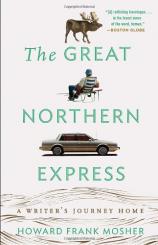The Great Northern Express: A Writer's Journey Home
Review
The Great Northern Express: A Writer's Journey Home
In the challenging world of publishing today, the burden on authors to promote their work never lets up. Still, it's doubtful many can match the odyssey 10-time novelist Howard Frank Mosher undertook shortly after he completed radiation treatments for prostate cancer at age 64, in 2007. In the course of a few months that year, he visited some 150 independent bookstores to promote his novel, ON KINGDOM MOUNTAIN. He portrays that journey, as well as one into his past and his early days as a writer, in his wry, gentle memoir, THE GREAT NORTHERN EXPRESS.
"Much more than an entertaining travelogue, THE GREAT NORTHERN EXPRESS offers one writer’s honest, unsentimental perspective on life and literature."
Mosher describes his cancer diagnosis and treatment as his "personal MacArthur fellowship," understanding all too well that a "brush with any potentially fatal illness can be a wake-up call, a reminder --- as if we needed one --- of our mortality and an opportunity." The trek also gave him a chance to experience a literary road trip he had planned to take at age 21 with Reg Bennett, a man he calls his "second father and honorary uncle," who had written a history of the small upstate New York town where Mosher spent a few years of his peripatetic childhood.
Conjuring John Steinbeck in his camper Rocinante, Mosher embarks from his home in rural Vermont in a 20-year-old Chevrolet Celebrity with 280,000 miles he christens the "Loser Cruiser." To ease the burden of solitude over the 20,000 miles he covers in that decrepit vehicle, he imagines conversations with a character he calls the "West Texas Jesus," a cantankerous figure with a taste for tall, cool ones, his beloved Uncle Reg, and even the neurologist Oliver Sacks.
Mosher is fastidious about acknowledging many of the indie bookstores he visited (Powell's in Portland and Prairie Lights in Iowa City, among the better known ones), and generous in recognizing the role they play in preserving what's left of our literary culture. "Aren't independent booksellers the last public guardians of our human rights and, along with librarians and teachers, the keepers of our cultural and literary traditions?" he asks.
There isn't much drama inherent in the life of an author on tour, though Mosher deftly recounts some of the more amusing incidents, like the night in Oregon he mistook a group of Goth teenagers for youngsters attending the launch of the final Harry Potter novel, or his attempt to connect with Garrison Keillor at his Common Good Books bookstore in St. Paul to apologize for a long-forgotten insult. Though Mosher is an able raconteur, at times his fundamental folksiness slips into an undue fondness for colloquial speech. Words and phrases like "hornswoggled" or "by crikey" occasionally sprout like weeds in his plainspoken prose. A little of that goes a long way.
The subtitle of Mosher's memoir offers a glimpse into the other storyline that animates the book. A sizable portion is devoted to the early days he spent with his wife, Phillis, in the small town of Orleans, Vermont, snug in that state's Northeast Kingdom (near the wonderfully-named Lake Memphremagog), where both began as schoolteachers (he English, she science) shortly after their marriage in 1964. He shares colorful stories of "Prof," the alcoholic superintendent who hired them, a man who measured the difficulty of his days by the number of "quarts" he consumed, and who enjoined Mosher to keep the kids "out of the mill," the town's Dickensian Ethan Allen furniture factory.
Mosher also dwells on his early efforts as a writer, as he struggled to find both a voice (he tells of writing one story that featured a sentence in the style of Hemingway followed by another in the style of Faulkner) and a subject matter in the stories of regional Vermont. In charting that halting progress, he brings to life colorful local characters like Jim Hayford, "the Northeast Kingdom's unofficial poet laureate," and Margery Moore, who poached a deer to feed her five children one winter and slipped it past the game warden by disguising it in an overcoat and slouch hat in the front seat of her car.
Much more than an entertaining travelogue, THE GREAT NORTHERN EXPRESS offers one writer’s honest, unsentimental perspective on life and literature. We can only admire Mosher’s tenacity as he endures cheap motels, bad food and lonely nights far from his beloved Phillis, all the while confronting the precariousness of his post-cancer existence. And we can’t help but wish this largehearted man the blessing of good health that will allow him to go on sharing the stories he so loves to tell.
Reviewed by Harvey Freedenberg on May 4, 2012
The Great Northern Express: A Writer's Journey Home
- Publication Date: March 5, 2013
- Genres: Nonfiction
- Paperback: 256 pages
- Publisher: Broadway
- ISBN-10: 0307450708
- ISBN-13: 9780307450708





